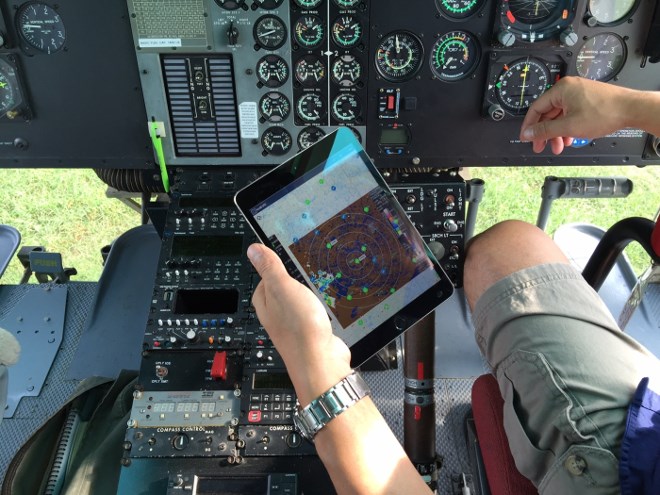The freedom of flight is what attracted Michael Kleywegt to aviation.
But it’s the blue sky potential of an emerging flight management software that’s keeping the Thunder Bay tech entrepreneur temporarily grounded.
The CEO of AirSuite Inc. has high hopes as his aviation tech company prepares to take the next big step in rolling out Cirro, a product developed in-house at Wisk Air Helicopters that was launched last year.
“We’re right on the tip of the iceberg of rolling it out into the market,” said Kleywegt in talking about the company’s prospects for 2017.
Based out of the Wisk Air hangar offices at the Thunder Bay airport, the past year was spent securing capital to scale up, add more staff, and start marketing and delivering the product to market.
Cirro – referring to high-level cloud - is a subscriber-based mobile flight management system designed for rotary-wing and fixed wing operators.
It eliminates all the paper clutter of pre-flight check-offs and automates the entire compliance process.
Ordinarily, pilots would use paper maps to create flight plans, scribble down their weight and balance calculations on another piece of paper, and write down their flight itineraries and post it to a wall map.
“There are a lot of very tedious items that have to be checked off to be able to perform a flight,” said Kleywegt. “You’re not supposed to hop in a machine and fly away like it’s a pickup truck, but there are lots of people that do. A lot of companies really drop the ball on this stuff.”
Their software keeps track of all those items like creating itineraries, logging pilot duty time, itemizing dangerous goods, mapping and GPS tracking, and storing a multitude of documents all under one program.
All of these compliance items have to be tracked and stored efficiently when government regulators or auditing firms come calling to take a peek at your records.
“When we did the initial launch, it had an overwhelming amount of interest from the market,” said Kleywegt.
Remote Helicopters of Alberta and two British Columbia aviation companies, Access Helicopters and Valley Helicopters, were among the early adopters.
“We have another four companies in the set-up stages,” said Kleywegt.
Kleywegt and business partner, Wisk Air president Mark Wiskemann, realized early on that Cirro had enough market potential to create a spinoff company.
That meant Klegwegt had to give up the pilot’s seat to focus full-time on running the software company.
His love for helicopters began as a child growing up in British Columbia. Kleywegt’s father worked for BC Rail on the Tumbler Ridge project.
His earliest memories were of being ferried to and from remote construction camps by helicopter, squished between his mother and older brother, and never quite being able to see out the window.
“I wanted a better view than the centre seat in the back so I got the best view and got my licence.”
Computer programming was always something he excelled at in high school.
He contemplated pursuing a computer engineering degree, but exploring the North and seeing the wilderness from above seemed more appealing than a desk job.
Flying helicopters for Zimmer Air meant spraying crops in southwestern Ontario and large stands of timber in northwestern Ontario for big logging customers.
On the side, he handled much of the company’s computer infrastructure and database, developing an aerial digital photography program and other custom applications.
A move to Wisk Air had him shuttling mining, hydro and government clients into the Arctic Circle and Ontario’s Far North.
When activity in the Ring of Fire heated up five years ago, auditors were regularly beating a path to Wisk Air – with as many as eight audits a year – consuming substantial staff time to review records and ensure everything was in order.
Kleywegt saw an opportunity to get the company better organized.
He started developing some software tools to more easily collect data, which evolved into Cirro.
Kleywegt said it’s not only designed to reduce the paperwork, but digitize it with a simple touch screen tool that can be loaded onto a computer, tablet and smartphone.
The company says aircraft operators can save between $200 and $2,000 or more a month in reducing paperwork, depending on fleet size and the number of pilots using Cirro.
Some potential customers find the product overwhelming.
“When you sit in a demo some people consider it like drinking from a fire hose,” said Kleywegt.
The company has eyes on taking Cirro internationally, as Kleywegt mentioned interest coming from the U.S., New Zealand and Algeria.
“We haven’t even been marketing into the U.S. but we’re starting to get a lot of traction down there.”
Now in its fifth iteration in five years, Kleywegt said software improvements are being done all the time, including revamping the mapping component.
“We’re going to bring a third dimension to the mapping software with much better offline capability and navigation.”
They’re also integrating with aviation maintenance tracking solution companies like Flightdocs, “which is a whole different beast out there.”
Last fall, the company received an undisclosed amount of next-level financing from Neegani Investments and Thunder Bay Ventures, a community futures development corporation, with more pending funding announcements.
The company has other irons in the fire, one of which is a mapping, navigation and flight planning product scheduled for release in July.
With a team of eight – comprising administrative and sales staff, tech support, programmers (plus five outsourced programmers in Kitchener-Waterloo) – the company is looking to move from the airport into a space of its own, said Kleywegt.
“But trying to find a place with fibre optics in town is a little challenging right now.”
More staff will be hired as the demand for the product increases.




